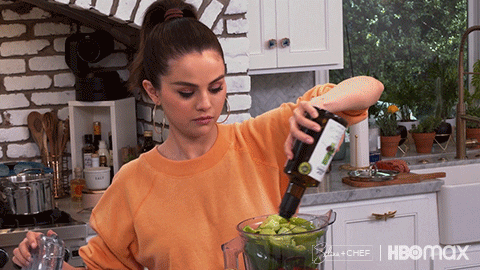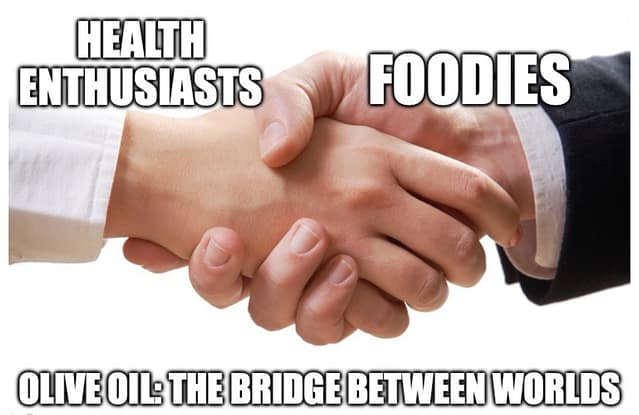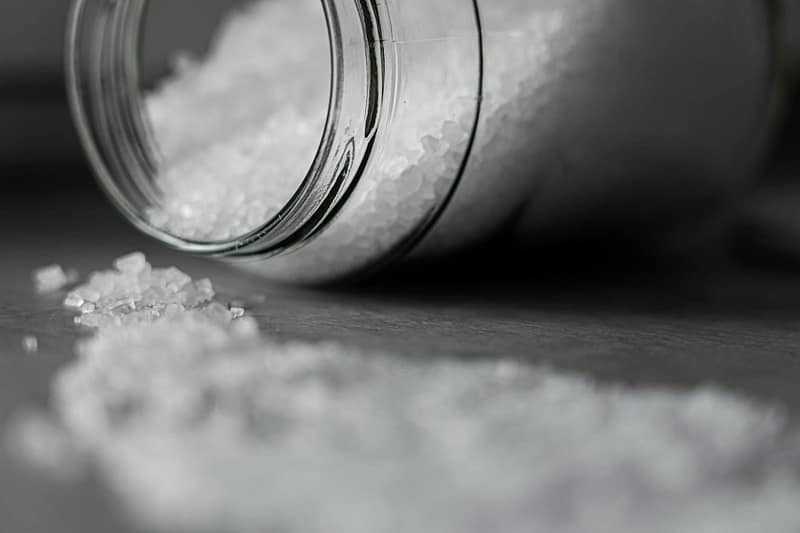Olive oil. You know it, you love it, and if you don’t, you’re either deeply misguided or just wrong. It’s the Jennifer Coolidge of cooking oils: versatile, timeless, and the right kind of extra. Whether you’re roasting vegetables, marinating meats, or trying to pass off store-bought bread as “artisan,” olive oil is the reason you’ll succeed. It elevates, enriches, and makes you feel like you actually know what you’re doing in the kitchen.
But olive oil is more than a pantry staple; it’s a lifestyle. It’s the ingredient that tells everyone, “I may not have my life together, but I have enough taste to drizzle liquid gold on my sourdough.” But what makes olive oil so special? And why are we willing to spend our rent money on it? Let’s break it down.

Olive Oil Origins: A Squeeze of History
Before we dive into why olive oil is the reigning monarch of your pantry, let’s talk about how it got there in the first place.
Olive oil has been around for a while. Archaeologists have found evidence of olive oil production dating back to 4000 BCE in the Mediterranean, proving that even ancient humans understood the value of a well-dressed salad. Ancient Egyptians used it for cooking and cosmetics, and the Greeks? They bathed in it. They also used it as fuel for lamps and as a prize for Olympic athletes, making it the precursor to both modern moisturizer and sports endorsements.
Rome took things up a notch by making olive oil production an industrial endeavor. They exported it across the empire, ensuring that even their far-flung colonies could fry their bread in style. By the Middle Ages, olive oil was the darling of Mediterranean diets and a key export, securing its legacy as a global staple.

Why Olive Oil Is a Foodie’s Best Friend
If olive oil had a résumé, it would be embarrassingly overqualified. Cooking fat? Check. Finishing touch? Check. Health benefits? Oh, you bet. Olive oil doesn’t just participate in your cooking—it dominates.
1. Flavor That Slaps
Let’s get one thing straight: Olive oil isn’t just a lubricant for your pan; it’s a flavor enhancer. A good extra virgin olive oil tastes bright, grassy, and a little peppery. It can take a dish from “meh” to “hell yeah” with just a drizzle. Whether it’s dressing up a salad or finishing a bowl of soup, olive oil adds complexity and depth that other fats can only dream of.
2. Versatility, Thy Name Is Olive Oil
There are very few foods that don’t benefit from olive oil’s presence. Roasting veggies? Toss them in olive oil. Marinating chicken? Add olive oil. Making a pasta sauce? Olive oil is your base. Baking a cake? Yes, even there. Olive oil cakes are a whole genre of dessert that is deeply underappreciated outside of Instagram.
3. Simplicity at Its Finest
Sometimes the best dishes are the simplest, and olive oil is the key. Take bruschetta, for example: It’s just toasted bread rubbed with garlic, drizzled with olive oil, and topped with tomatoes. It’s not just food; it’s an edible flex that says, “I care about my ingredients and also maybe I’ve been to Italy.”

Cooking with Olive Oil: The Dos and Don’ts
DO Use It Liberally
Olive oil is not the time to be shy. You’re not going to ruin your dish with too much olive oil (unless you’re deep-frying with it, in which case, who hurt you?). Toss it, drizzle it, coat everything in sight. Olive oil is your culinary hype girl, and she’s here to make everything taste better.
DON’T Burn It
Let’s have a moment of silence for all the beautiful olive oil wasted because someone thought they could fry chicken at 450°F with it. Olive oil has a relatively low smoke point, which means it burns faster than you think. For high-heat cooking, stick to more neutral oils like canola or avocado. Save olive oil for sautéing, roasting, or drizzling.
DO Use It Raw
This is where olive oil shines the brightest. Use it as a finishing touch—on pasta, soups, salads, or even grilled meats. A drizzle of good olive oil adds a rich, luxurious mouthfeel that makes everything taste fancy.
DON’T Skimp on Quality
Yes, high-quality olive oil is expensive. No, the $5 plastic jug from the bottom shelf of your grocery store does not count. A good bottle of extra virgin olive oil will cost you $15 to $30, and yes, it’s worth every penny. Cheap olive oil tastes like sadness and missed opportunities.

Recipes That Prove Olive Oil Is a Boss
Let’s get practical: How do you actually use olive oil to elevate your cooking game?
1. Roasted Vegetables That Taste Like Candy
Toss your favorite veggies (think carrots, sweet potatoes, and Brussels sprouts) with olive oil, salt, pepper, and a pinch of sugar. Roast them at 425°F until they’re golden and caramelized. Bonus points if you add a drizzle of balsamic vinegar at the end.
2. Garlic-Infused Olive Oil
Take a cup of olive oil and gently heat it with a handful of smashed garlic cloves. Let it cool, then strain. Congratulations, you just made the best garlic bread topping of your life.
3. Olive Oil Ice Cream
Yes, this is real. Mix olive oil into your vanilla ice cream base, then sprinkle with flaky sea salt before serving. It’s weird in the best way.

How Olive Oil Compares to Other Fats
Let’s address the elephant in the pantry: Why olive oil over butter or other cooking oils?
Butter: The Tempting Foe
Butter has a rich, creamy flavor that olive oil can’t replicate. But butter burns quickly and isn’t as versatile. Olive oil, on the other hand, works in both savory and sweet dishes without overpowering.
Other Cooking Oils: Meh
Canola, vegetable, and sunflower oils are fine, but they’re background players. Olive oil is the Lady Gaga of the oil world—it doesn’t just blend in; it steals the show.

The Downsides of Olive Oil
Because I’m honest AF, let’s talk about olive oil’s flaws.
1. The Price
Quality olive oil is expensive. You’ll cry a little when you hand over your credit card, but then you’ll taste it, and those tears will turn to joy.
2. It’s Temperamental
Olive oil hates heat, light, and air. Store it in a cool, dark place, and keep the bottle tightly sealed. Otherwise, it’ll go rancid faster than milk left on a sunny porch.
3. It’s Not Great for Frying
Olive oil’s low smoke point makes it unsuitable for high-heat frying. If you’re frying chicken or making donuts, stick to oils with a higher smoke point.

Final Thoughts: Is Olive Oil Worth It?
Yes. A thousand times yes. Olive oil is the secret weapon of the kitchen. It’s versatile, flavorful, and just pretentious enough to make you feel like a chef every time you use it.
So the next time you’re in the grocery store, skip the sadness that is cheap vegetable oil and invest in a good bottle of extra virgin olive oil. Trust us: Your roasted vegetables, salad dressings, and life in general will thank you.
Let olive oil be the suit and tie in your pantry—it’s worth every penny.

Further Reading:
Karadsheh, Suzy. “Cooking with Olive Oil: Everything You Need to Know!” The Mediterranean Dish. Nov. 21, 2024.
Kathan, Scott. “Is It Okay to Cook with Extra-Virgin Olive Oil?” America‘s Test Kitchen. Oct. 9, 2022.
Roig, Alex. “A Journey Through Ancient Civilizations: The History of Olive Oil.” Ask Alex. June 26, 2023.












Spot on, nothing tastes as good as a good quality olive oil!
A put’s the *chef’s kiss* into the culinary creation!